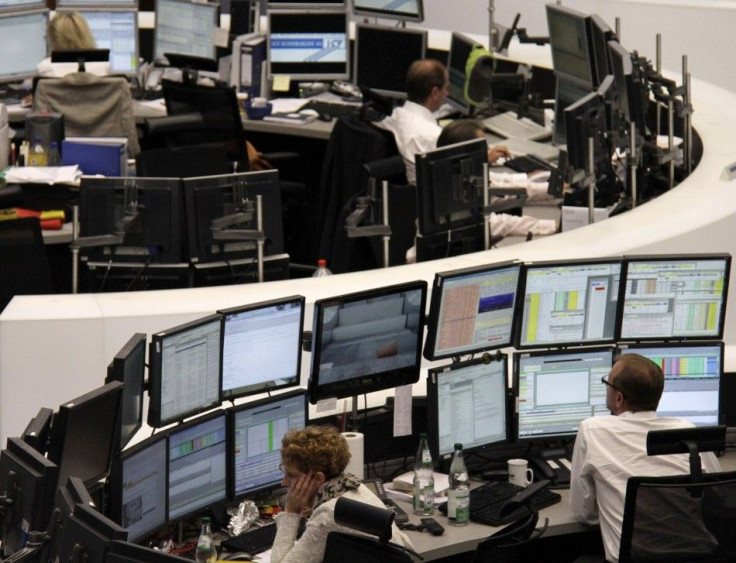How Hope and Faith Are Dominating Investment Decisions
ANALYSIS

Corporations are booking huge third-quarter profits and sitting on gargantuan piles of cash -- and nothing could be less important.
What seems to drive money managers and retail investors is the comparatively trivial minutiae of the latest Brussels news conference, the outcome of a Slovakian parliamentary vote or the fact that French President Nicolas Sarkozy decided to miss his child's birth so he could rush to Germany and huddle with the head of the continent's biggest economy. (Were Carla's feelings hurt? Stay tuned.)
In short, equity and currency markets appear more disconnected from the actual engines of the real economy than at any time in recent memory. Instead, stock and currency markets seem driven by an almost religious faith in the ability of political tricks to trump economic reality.
About the only economic reality that gets investor attention these days are figures on Chinese manufacturing and Brazilian interest rates.
Here's a sample of what occupies financially oriented Twitter posts, chat rooms and article commentary: Will the Fed conclude its two-day meeting with a hint of more quantitative easing? Can Chancellor Angela Merkel continue the balancing act of working to save the Eurozone and still maintain her ruling coalition? Will the plan by Greece's prime minister to have his constituents vote on whether to accept the next tranche of bailout money really be carried out?
All these have some importance, but lately they have been elbowing out authentically consequential considerations.
WHAT MARKETS ARE IGNORING
Markets are ignoring robust third-quarter earnings. UBS says that, as of Tuesday, 263 companies beat third-quarter earnings expectations out of 362 reported results, which is 73 percent. Excluding the financials sector, 222 beat expectations out of 296 reported results, which is 75 percent.
Goldman Sachs says that among companies that have already issued third-quarter earnings, the average earnings-per-share surprise has been 5.3 percent, above the 4.1 percent historical aveage. Goldman Sachs also also says that, excluding financials, there have been more positive surprises, 41 percent, than negative surprises, eight percent.
Here are some examples.
AOL Inc.'s third-quarter results beat analyst expectations, despite revenue falling six percent.
Pfizer Inc., the world's largest drug maker, reported third-quarter profit that topped analysts' expectations based on U.S. growth of their cholesterol block-buster drug Lipitor, favorable foreign exchange rates and increases in overseas sales.
Goodyear Tire & Rubber Co. reported a much higher-than-expected third-quarter profit, helped by an 18 percent rise in revenue per tire, and its shares rose more than 7 percent.
MasterCard Inc.'s third-quarter profit easily beat Wall Street estimates on double-digit increases in volumes.
Chemicals maker Albemarle Corp. reported a higher-than-expected quarterly profit on strong sales of catalysts used by petroleum refiners.
Goldman Sachs says 82 percent
Markets also are ignoring the gargantuan piles of cash corporations are sitting on. Here's a sample from the tech sector, based on each corporation's latest quarterly results:
- Microsoft has $57.1 billion
- Apple has $81.5 billion
- Google has $92.6 billion
- Oracle has $41.6 billion
The third thing mood-dominated markets ignore is big-picture realities in Europe, the United States and elsewhere.
Next year Italy must roll over €300 billion of bonds from its €1.6 trillion debt load. What interest rate will Rome or its rescuers have to cough up to make that happen?
The Institute for Supply Management's data is back to flirting with cycle-lows. According to ISM data for September, a mere 44.4 percent of industries reported expansion, down three-quarters from a year ago.
Most of the world's economies had purchasing managers' indices last month that were weak, yet again.
THE CONSEQUENCE
The upshot of the market's recent fixation on rumors from Brussels and Washington as opposed to corporate earnings and their big cash balances, is market volatility.
Stocks soared last week European leaders unveil their grand plan, which was actually a plan to have a plan. Then they plunged when the Greek prime minister said he plans to let his voters decide on whether to accept more bailout money. Then they soared when his cabinet endorses his referendum announcement. And so it goes.
The benchmark measure of volatility, the VIX, has been at 30 or higher 85 percent of the time since Aug. 1. In the same time period, the Dow Jones Industrial Average has had intra-session swings of 200 points more than 70 percent. Just this week the VIX has soared 42 percent.
Another upshot of the market's fixation on news conferences is mockery.
Here's a sample from the chief economist at Gluskin + Sheff Associates Inc., a top North American money manager, summarizing the market's response last week to Europe's plan to solve its debt crisis.
It is incredible how the masses bought into this. A plan with details to be filled in later, that proposed leverage (which does not reduce risk but rather concentrates it) but no paid-in capital and no sign it could get any serious financial backing (a day later the move is on the get China to pony up? And then Japan? Are you kidding?). And this is what got everyone excited last week. It was 'comprehensive' -- it was 'disjointed.' But a market clinging to announcements, press conferences, photo opportunities and summits, at least had a 'plan.'
© Copyright IBTimes 2024. All rights reserved.












